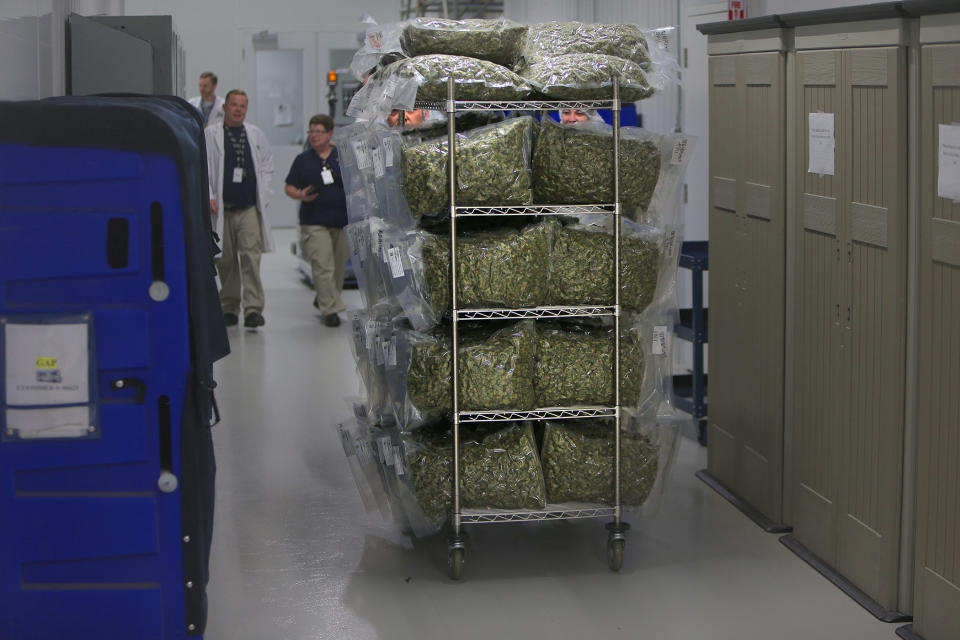Canopy Growth shares surge 20%, sales up 62% in Q3
Canopy Growth’s (WEED.TO)(CGC) sales climbed to $124 million in the company’s fiscal third quarter of 2020, topping analyst estimates while posting a narrower loss. The company largely attributed the revenue increase to over 140 pot stores opening their doors.
The Smiths Falls, Ont.-based licenced producer’s net revenue for the three months ending Dec. 31, 2019 represents a 62 per cent increase from the $76 million reported in the previous quarter.
“Adding more stores is a pressure relief valve for some of the ills of the cannabis sector at the moment,” chief executive officer David Klein told Yahoo Finance Canada in an interview on Friday. “The biggest driver for us is being consistently on the shelf for more consumers.”
The company shrunk its EBITDA loss to $92 million, compared to $156 million in the prior period.

Toronto-listed shares shot up nearly 20 per cent in early trading.
Analysts polled by Bloomberg expected net revenue of $105 million and an EBITDA loss of $110 million.
“Make no mistake, we have a lot of work to do,” Klein said on a conference call with analysts on Friday. “I am already taking actions to keep us in the leadership position in the cannabis industry.”
The former chief financial officer of Canopy’s largest shareholder, Corona beer-maker Constellation Brands (STZ), started leading the pot giant in January following a months-long search to replace ousted co-CEO Bruce Linton.
In his first earnings call as Canopy’s chief executive, Klein spelled out his three-pronged set of priorities for the world’s largest cannabis producer by market capitalization. They include; improving relationships with customers, bringing more focus and discipline to the business, and defining a path to profitability and positive free cash flow.
“We will do this by delivering on our commitments in a thoughtful and measured fashion,” he said. “The industry has evolved and we need to focus on specific markets where we have the legitimate right to win.”
One market he intends to win is the United States. Canopy has a deal in place to acquire New York-based Acreage Holdings (ACRG-U.CN)(ACRGF) should cannabis sales become legal under U.S. federal law. The company recently commenced online sales of its U.S.-focused CBD brand First & Free.
“We want to and need to move faster and make bolder moves in the U.S., and are focused on creating brands that resonate with our consumers,” he said.
Klein’s plan to steer Canopy towards profitability includes an ongoing “strategic review” of the company’s cultivation footprint. Analysts have raised concerns about Canopy’s inventory outstripping demand in the legal market.
“We're prepared to take initial steps to right-size our business over the next 90 days,” he said.
Open for business
The slower-than-expected roll out of physical retail locations in Canada, especially in Ontario, has been been a persistent headwind for the legal cannabis sector at large.
Klein’s predecessor, Mark Zekulin, said last November that delays in Ontario resulted in half of the expected market in that province “simply not existing.”
Canada’s most populous province overhauled is regulatory process for approving new stores late last year. The Ontario government expects store authorizations at a pace of 20-per-month beginning in April.
Canopy reported a dominant 22 per cent share of Canada’s recreational market. Recreational sales increased eight per cent quarter-over-quarter. The company attributes that strength to strong demand for both premium and value-priced dried flower and pre-rolled joints.
The company said holiday spending in the quarter added about $5 million in incremental sales.
“We were particularly encouraged to see Canopy print a solid sequential increase in its recreational sales in a period where many of its peers are anticipated to see flat to lower revenues,” Canaccord Genuity analyst Matt Bottomley wrote in a note to clients on Friday.
He points out that Canopy’s recreational average selling price per gram was two per cent higher quarter-over-quarter at $5.79, while some peers reported declines of between 10 and 20 per cent.
Canopy saw a five per cent quarterly increase in medical sales, stronger revenue from its international C3 cannabis business and improved medical sales in Germany.
Canopy noted that cost-cutting measures and reduced stock-based compensation also led to the smaller quarterly loss.
“We plan to take further steps to reduce our costs and right-size our business to ensure that we can generate a healthy margin profile and cash generation in the coming years,” chief financial officer Mike Lee said in the statement.
CIBC analyst John Zamparo said the warm reception from investors on Friday may reflect relief among those who had braced for bad news.
“Many investors had expected this quarter had potential for noisy results stemming from further revenue provisions and potential asset impairments. The company announced none of either,” he wrote in a note to clients.
No word on drinks timeline
Notably absent in the financial filings was a promised update on the status of the company’s delayed cannabis drinks portfolio.
Canopy said in December that its infused beverages would hit the market in early January, before announcing a delayed launch on Jan. 17.
Yahoo Finance Canada reported on Thursday that issues related to the company’s use of aluminum cans may be responsible for the setback. Canopy told Yahoo Finance Canada in an email that it was aware the packaging could be a risk, without offering specific details.
Speaking on the earnings call, Klein did not address the specific cause of the delay. He suggested problems occurred in the transition from “lab scale” to “commercial scale.”
“We’ve had some issues as we’ve made that jump. Also, understand that it’s a very involved quality process that we’re putting ourselves through,” he said. “It’s just taking longer than we would like, but we think it’s worth getting the products right as opposed to rushing them out there to make an in-market date.”

 Yahoo Finance
Yahoo Finance 
